Hungarian actress and singer Sári Fedák (1879-1955) was one of the most famous prima donnas of her time. The temperamental operetta and film star was mixed up in several scandals.
![Sári Fédak]()
Hungarian postcard by NPG, no. 0123/12,1906. Photo: Strelisky, Budapest.
Sári Fedák or Fédak Sári was born in Beregszász, Hungary (now Berehove, Ukraine) in 1879.
She studied acting with Szidi Rákosi until 1899, and began her career the same year with the Magyar Színház theatre company. From 1900 in, she played in Pozsony (now Bratislava), and in several theatres in Budapest.
In 1907, she was mixed up in a scandal after the suicide of the popular playwright Paul Widor. According to an article in The Los Angeles Herald, angry crowds stormed her house and threatened her with death if she fell into their hands. Fedák was the well paid star in a disastrous stage production of Widor, which had ruined him and caused his suicide.
Sári left Hungary and conquered Berlin in 1908, Vienna in 1909, and London and Paris in 1910. When she returned to Budapest the public welcomed her back.
In 1912, she made her film debut in the short comedy Gazdag ember kabátja/Rich man’s coat (Andor K. Kovács, 1912) based on a story by the famous Hungarian playwright and novelist Ferenc Molnár.
The next year, she co-starred with Alfréd Deésy in Rablélek (1913), directed by Mihály Kertész who later became the famous Hollywood director Michael Curtiz.
In Márta (Ödön Uher ifj., 1913), she co-starred with Várkonyi Mihály, who became internationally known as Victor Varconi.
Another silent film was Három hét/Three Weeks (Márton Garas, 1917), based on a novel by Elinor Glyn.
Following World War I, she spoke out against the Austro-Hungarian monarchy. In 1919, during the short run of the Hungarian Soviet Republic she agitated for joining the Red Army.
After the fall of the Republic, Fedák fled to Vienna, but was captured and held in prison at Wiener Neustadt for a short time.
As a supporter of the Republic, she could play in only Vienna from 1920-21. She made appearances in Berlin and Paris in 1921 and 1925. In 1923, she became a member of the Fővárosi Operettszínház theatre.
![Sári Fédak]()
Hungarian postcard by KIV, Budapest. Photo: Strelisky, Budapest.
![Sári Fédak]()
Hungarian postcard by S.J., Budapest. Photo: Strelisky, Budapest.
In 1922 Sári Fedák married Ferenc Molnár, after a six-year relationship. The couple divorced in 1925 or 1926, after he reportedly had accused her of intimate relationships with 42 gentlemen, and she had replied in kind with a list of 142 ladies who were said to have received his favours.
In 1927 there was another scandal when Fedák was sued by rival actress Vilma Banky. Fedák would have called her ‘that little lowdown Budapest cat’. Time magazine published a report of the trial including a description of Fedák’s entrance in the court room “clad in a black gown tight as a snake skin, looking perhaps half her 43 years”. The court dismissed the case.
After the introduction of sound film, she made her come-back in the cinema with Iza néni/Miss Iza (Székely István a.k.a. Steve Sekely, 1933) opposite Pál Jávor.
In 1934, she toured several American cities. She used her American experiences for the script of Mámi (Vaszari János a.k.a. Johann von Vásáry, 1937) in which she played the title figure, a Hungarian woman retuning from Texas.
The success lead to other films like Az örök titok/The Eternal Secret (István György, 1938), Érik a búzakalász/The Wheat Ripens (Béla Gaál, 1939) and Bob herceg/Prince Bob (László Kalmár, 1941).
Starting in 1940, she was the leading actress in the Új Magyar Színház theatre. In 1944, working at the Donausender radio station in Vienna, she rallied for Hungary to continue the fight in World War II on the side of Nazi Germany. For this act, she was sentenced to eight months in prison after the war, and she was banned from playing in theatres for three years. The court order broke her career: she never appeared on stage again.
After being released from prison, she moved to Nyáregyháza, retiring from active life. Sári Fedák died in 1955 in Budapest, Hungary, aged 75, and was interred in Budapest's Farkasréti Cemetery.
![Sari Fedák]()
Hungarian postcard, no. 21. Photo: Miklós Labori, Budapest. Collection: Didier Hanson.
![Sári Fédak]()
Austrian postcard by Iris Verlag, no. 323. Photo: Fayer.
Sources: Los Angeles Herald, Magyar Színházmüveszeti Lexikon (Hungarian), Wikipedia and IMDb.
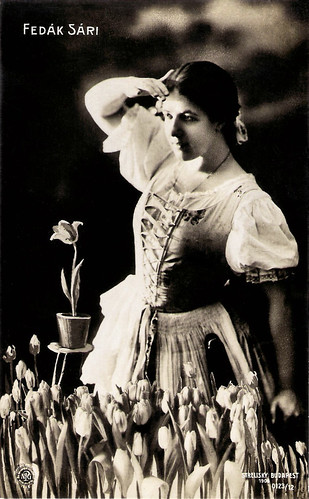
Hungarian postcard by NPG, no. 0123/12,1906. Photo: Strelisky, Budapest.
Angry Crowds Stormed Her House
Sári Fedák or Fédak Sári was born in Beregszász, Hungary (now Berehove, Ukraine) in 1879.
She studied acting with Szidi Rákosi until 1899, and began her career the same year with the Magyar Színház theatre company. From 1900 in, she played in Pozsony (now Bratislava), and in several theatres in Budapest.
In 1907, she was mixed up in a scandal after the suicide of the popular playwright Paul Widor. According to an article in The Los Angeles Herald, angry crowds stormed her house and threatened her with death if she fell into their hands. Fedák was the well paid star in a disastrous stage production of Widor, which had ruined him and caused his suicide.
Sári left Hungary and conquered Berlin in 1908, Vienna in 1909, and London and Paris in 1910. When she returned to Budapest the public welcomed her back.
In 1912, she made her film debut in the short comedy Gazdag ember kabátja/Rich man’s coat (Andor K. Kovács, 1912) based on a story by the famous Hungarian playwright and novelist Ferenc Molnár.
The next year, she co-starred with Alfréd Deésy in Rablélek (1913), directed by Mihály Kertész who later became the famous Hollywood director Michael Curtiz.
In Márta (Ödön Uher ifj., 1913), she co-starred with Várkonyi Mihály, who became internationally known as Victor Varconi.
Another silent film was Három hét/Three Weeks (Márton Garas, 1917), based on a novel by Elinor Glyn.
Following World War I, she spoke out against the Austro-Hungarian monarchy. In 1919, during the short run of the Hungarian Soviet Republic she agitated for joining the Red Army.
After the fall of the Republic, Fedák fled to Vienna, but was captured and held in prison at Wiener Neustadt for a short time.
As a supporter of the Republic, she could play in only Vienna from 1920-21. She made appearances in Berlin and Paris in 1921 and 1925. In 1923, she became a member of the Fővárosi Operettszínház theatre.
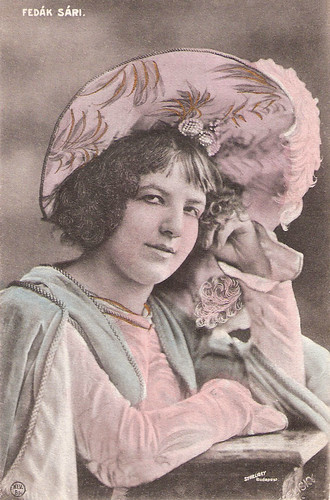
Hungarian postcard by KIV, Budapest. Photo: Strelisky, Budapest.
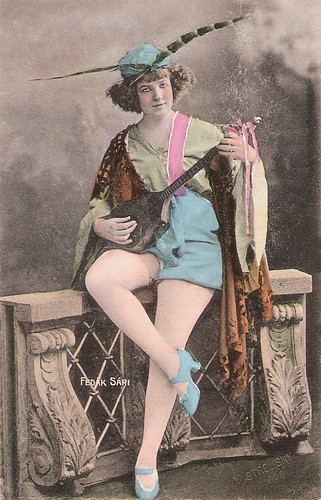
Hungarian postcard by S.J., Budapest. Photo: Strelisky, Budapest.
Intimate Relationships With 42 Gentlemen
In 1922 Sári Fedák married Ferenc Molnár, after a six-year relationship. The couple divorced in 1925 or 1926, after he reportedly had accused her of intimate relationships with 42 gentlemen, and she had replied in kind with a list of 142 ladies who were said to have received his favours.
In 1927 there was another scandal when Fedák was sued by rival actress Vilma Banky. Fedák would have called her ‘that little lowdown Budapest cat’. Time magazine published a report of the trial including a description of Fedák’s entrance in the court room “clad in a black gown tight as a snake skin, looking perhaps half her 43 years”. The court dismissed the case.
After the introduction of sound film, she made her come-back in the cinema with Iza néni/Miss Iza (Székely István a.k.a. Steve Sekely, 1933) opposite Pál Jávor.
In 1934, she toured several American cities. She used her American experiences for the script of Mámi (Vaszari János a.k.a. Johann von Vásáry, 1937) in which she played the title figure, a Hungarian woman retuning from Texas.
The success lead to other films like Az örök titok/The Eternal Secret (István György, 1938), Érik a búzakalász/The Wheat Ripens (Béla Gaál, 1939) and Bob herceg/Prince Bob (László Kalmár, 1941).
Starting in 1940, she was the leading actress in the Új Magyar Színház theatre. In 1944, working at the Donausender radio station in Vienna, she rallied for Hungary to continue the fight in World War II on the side of Nazi Germany. For this act, she was sentenced to eight months in prison after the war, and she was banned from playing in theatres for three years. The court order broke her career: she never appeared on stage again.
After being released from prison, she moved to Nyáregyháza, retiring from active life. Sári Fedák died in 1955 in Budapest, Hungary, aged 75, and was interred in Budapest's Farkasréti Cemetery.
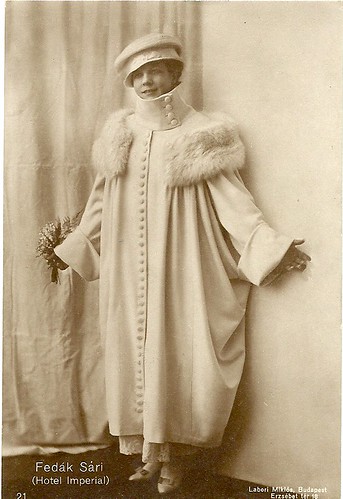
Hungarian postcard, no. 21. Photo: Miklós Labori, Budapest. Collection: Didier Hanson.
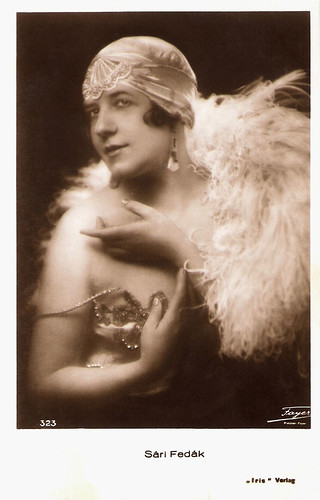
Austrian postcard by Iris Verlag, no. 323. Photo: Fayer.
Sources: Los Angeles Herald, Magyar Színházmüveszeti Lexikon (Hungarian), Wikipedia and IMDb.